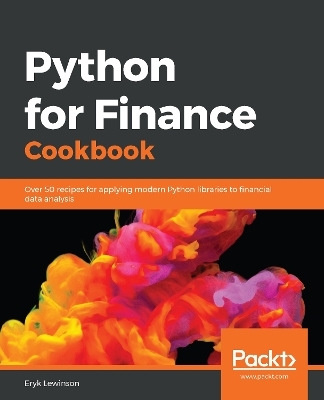
Python for Finance Cookbook
Packt Publishing Limited (Verlag)
978-1-78961-851-8 (ISBN)
Solve common and not-so-common financial problems using Python libraries such as NumPy, SciPy, and pandas
Key Features
Use powerful Python libraries such as pandas, NumPy, and SciPy to analyze your financial data
Explore unique recipes for financial data analysis and processing with Python
Estimate popular financial models such as CAPM and GARCH using a problem-solution approach
Book DescriptionPython is one of the most popular programming languages used in the financial industry, with a huge set of accompanying libraries.
In this book, you'll cover different ways of downloading financial data and preparing it for modeling. You'll calculate popular indicators used in technical analysis, such as Bollinger Bands, MACD, RSI, and backtest automatic trading strategies. Next, you'll cover time series analysis and models, such as exponential smoothing, ARIMA, and GARCH (including multivariate specifications), before exploring the popular CAPM and the Fama-French three-factor model. You'll then discover how to optimize asset allocation and use Monte Carlo simulations for tasks such as calculating the price of American options and estimating the Value at Risk (VaR). In later chapters, you'll work through an entire data science project in the financial domain. You'll also learn how to solve the credit card fraud and default problems using advanced classifiers such as random forest, XGBoost, LightGBM, and stacked models. You'll then be able to tune the hyperparameters of the models and handle class imbalance. Finally, you'll focus on learning how to use deep learning (PyTorch) for approaching financial tasks.
By the end of this book, you’ll have learned how to effectively analyze financial data using a recipe-based approach.
What you will learn
Download and preprocess financial data from different sources
Backtest the performance of automatic trading strategies in a real-world setting
Estimate financial econometrics models in Python and interpret their results
Use Monte Carlo simulations for a variety of tasks such as derivatives valuation and risk assessment
Improve the performance of financial models with the latest Python libraries
Apply machine learning and deep learning techniques to solve different financial problems
Understand the different approaches used to model financial time series data
Who this book is forThis book is for financial analysts, data analysts, and Python developers who want to learn how to implement a broad range of tasks in the finance domain. Data scientists looking to devise intelligent financial strategies to perform efficient financial analysis will also find this book useful. Working knowledge of the Python programming language is mandatory to grasp the concepts covered in the book effectively.
Eryk Lewinson received his Master's degree in Quantitative Finance from Erasmus University Rotterdam. In his professional career, he gained experience in the practical application of data science methods while working for two “Big 4” companies and a Dutch FinTech scale-up. In his work, he focuses on using machine learning for providing business value to the company. In his free time, he enjoys writing about topics related to data science, playing video games, and traveling with his girlfriend.
Table of Contents
Financial Data and Preprocessing
Technical Analysis in Python
Time Series Modelling
Multi-factor Models
Modeling Volatility with GARCH class models
Monte Carlo Simulations in Finance
Asset Allocation in Python
Identifying Credit Default with Machine Learning
Advanced Machine Learning Models in Finance
Deep Learning in Finance
| Erscheinungsdatum | 06.02.2020 |
|---|---|
| Verlagsort | Birmingham |
| Sprache | englisch |
| Maße | 75 x 93 mm |
| Themenwelt | Mathematik / Informatik ► Informatik ► Theorie / Studium |
| Mathematik / Informatik ► Informatik ► Web / Internet | |
| Mathematik / Informatik ► Mathematik ► Computerprogramme / Computeralgebra | |
| ISBN-10 | 1-78961-851-7 / 1789618517 |
| ISBN-13 | 978-1-78961-851-8 / 9781789618518 |
| Zustand | Neuware |
| Haben Sie eine Frage zum Produkt? |
aus dem Bereich


